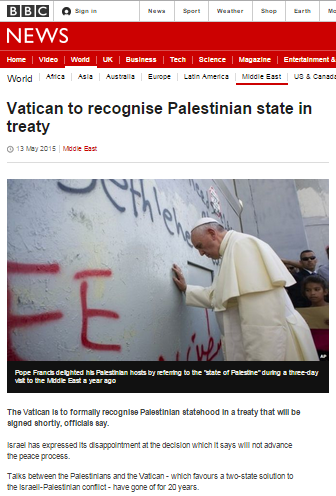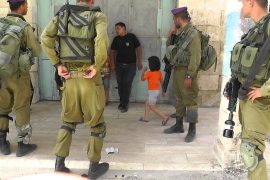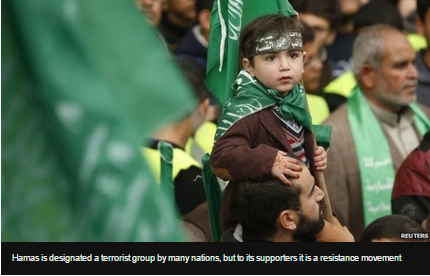On May 13th the BBC News website’s Middle East page published a report titled “Vatican to recognise Palestinian state in treaty“. The main image selected to illustrate that article dates from May 2014 when the Pope visited the Middle East and chose to pray beside a section of the anti-terrorist fence covered in graffiti which included a spurious comparison between Bethlehem and the Warsaw Ghetto.
The closing paragraphs of the report state:
“This weekend President Abbas will have talks with Pope Francis at the Vatican, and on Sunday he will be attend [sic] a canonisation ceremony during which two Palestinian nuns who lived in the 19th Century – when Palestine was part of the Ottoman empire – will be declared saints.
They will be the first new saints from the Arab world to be named since the early days of Christianity.”
As our colleagues at CAMERA have pointed out, that latter statement is not accurate. In 1977 a Lebanese Maronite Christian was canonized and at least two other saints of Lebanese origin alone have been canonized since then.
As was also the case with many other media outlets, the BBC’s report focuses audience attentions on the political aspects of the story.
“The Vatican is to formally recognise Palestinian statehood in a treaty that will be signed shortly, officials say. […]
The Vatican’s announcement comes amid growing momentum to recognise Palestinian statehood. Over the last year the European Parliament as well as the UK, Republic of Ireland, Spain and France have all passed non-binding motions in favour.
Sweden has gone further, officially recognising Palestine as a state.”
Readers also came across the following opaque generalised statements:
“The Vatican is eager that property and civil rights of the Catholic Church in the Palestinian state is protected, correspondents say.
According to the New York Times, it has strong religious interests in the Israeli-occupied Palestinian territories that include Christian holy sites.
The BBC’s David Willey in Rome says that Pope Francis is making every effort to strengthen the Christian presence in the Middle East at a time when when [sic] hundreds of thousands of Arab Christians are fleeing Islamic violence. […]
The agreement on Wednesday will define Catholic Church activities in areas controlled by the Palestinian Authority, the Holy See said on Wednesday.”
A clue to the context behind those vague statements and insight into a no less significant aspect of the treaty between the Vatican and the Palestinian Authority is provided by the Catholic News Service:
“Msgr. Antoine Camilleri, the Vatican undersecretary for relations with states and head of the Vatican delegation at the negotiations, said the Vatican wanted the agreement to “promote the life and activity of the Catholic Church and its recognition on a juridical level.” […]
The chapter on “freedom of religion and conscience,” he said, is “very elaborate and detailed.”
Other chapters deal with “various aspects of the life and activity of the church in the Palestinian territories: its freedom of action, its personnel and jurisdiction, its personal status, houses of worship, social and charitable activity (and) means of social communication. Finally, a chapter is dedicated to financial and property questions.
Asked if the agreement could be a model for agreements with other Muslim-majority countries, Msgr. Camilleri said every bilateral treaty deals with the specific situation of the countries involved.
“In this case, because it deals with the presence of the church in the land where Christianity was born, the agreement has a unique value and significance,” he said.
At the same time, though, he said the agreement’s recognition of the church and of religious freedom “could be followed by other countries, including those with a Muslim majority, and demonstrate that such recognition is not incompatible with the fact that the majority of the country’s population belongs to another religion.””
La Stampa’s Vatican Insider adds:
“But the debate over the recognition of the State of Palestine must not overshadow other passages in the agreement which promise to be of significance. They have not been made public yet but they were summarised by the Under-Secretary for Relations with States, Antoine Camilleri, who is head of the Vatican delegation at the negotiations.
Having announced that the preamble will express the Holy See’s hope for a two-State solution (entailing the Palestinian side’s full recognition of the legitimacy of the State of Israel), the prelate explained that the agreement contains a “very elaborate and detailed” chapter on the “freedom of religion and conscience”. The legal agreement then sets out a number of fundamental elements regarding religious freedom and the freedom of conscience for all those living and working in the Palestinian Territories. Guarantees, such as respect for places of worship, the freedom of action of the Church, the protection of its social and charitable activities and the right to promote means of communication, are put down in black and white.”
Given that the BBC’s interest in the topic of Middle East Christians has increased of late due to prevailing events on the ground, one might have thought that news of a treaty aimed at protecting their religious freedom in one part of the region would have prompted the self-styled ‘standard-setter for international journalism‘ to break away from the media pack and provide its audiences with informative coverage of the background story of why the rights of Christians need to be protected in an agreement between the Vatican and the Palestinian Authority.




